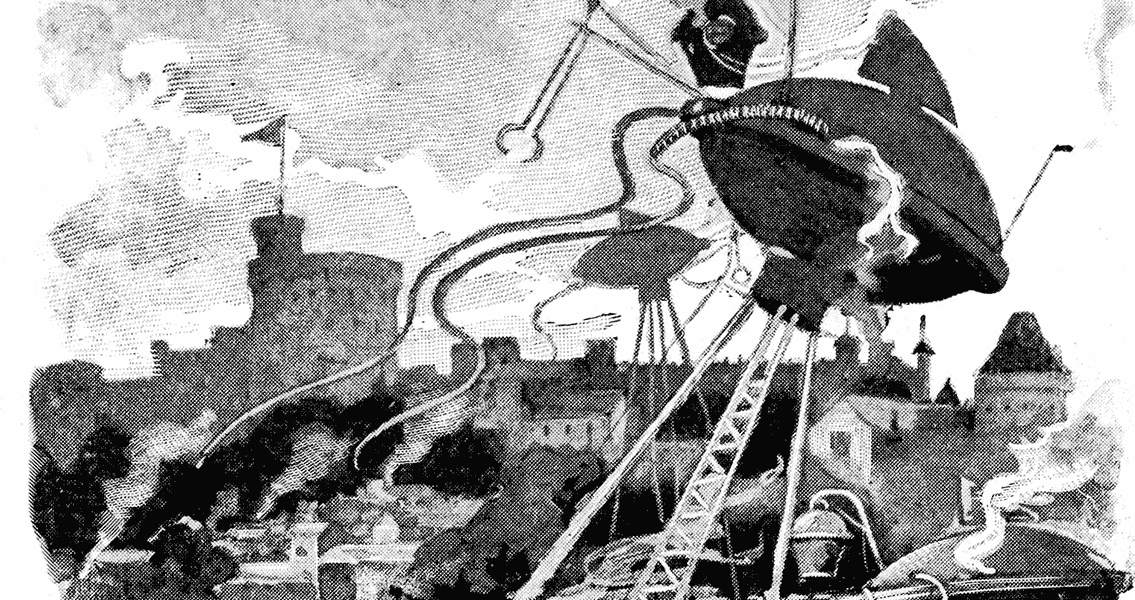<![CDATA[On October 30th 1938, the United States was terrorised by a Martian Invasion. As radio broadcasters provided updates of an attack that had started in New Jersey, panic spread across the nation. Throughout the evening news bulletins continued to provide coverage of the alien's terrifying advance, interrupting the usual Sunday primetime programming. All of this is true, but the invasion that caused such widespread panic was purely fictitious. The broadcast was the work of 23 year old Orson Welles and his Mercury Theatre Company. Welles had already been working in radio for several years on the popular program the 'Shadow'. In anticipation of Halloween 1938, Welles decided to produce an adaptation of H.G. Wells' War of the Worlds, a nineteenth century science fiction novel depicting an alien invasion. The crucial difference was that Welles decided to present the story as a series of radio broadcasts, simulating news bulletins over a prime time dance music show. As audiences settled in to listen to the music of Ramon Raquello and his orchestra, it seemed like a standard Sunday evening. One reason for the hoax's impact was that it was delivered during the peak time for radio in this period. Another reason for its impact was that many people heard it slightly out of context. Many Americans had been listening to a popular comedy broadcast on rival station NBC, before changing over to CBS just after that program finished. This meant that they missed the crucial explanation at the start of Welles' radio broadcast - the revelation that it was only a play. Shortly into the show, an announcer broke in with news that explosions had been detected on Mars. The music returned, the announcement offered no further explanation. The next announcement reported that a large meteorite had landed in a farmer's field in Grover's Mill, New Jersey. Such dramatic news interruptions were not unusual in 1930s America. Japanese aggression in the Pacific and the increasingly volatile situation in Europe meant that such news bulletins were trusted and listened to attentively. As such, many American's took the news of Martian activity very seriously. As the story progressed, descriptions of tentacle covered Martians, death rays and giant walking machines filled the airwaves. In New Jersey the roads started to fill as people tried to evacuate the city. Others locked themselves in cellars with loaded guns, covering their faces with wet clothes to protect them from Martian gas. There are stories of a woman running into a church in Indianapolis and declaring the destruction of New York and the end of the world. Historians have since questioned the actual amount of people taken in by the hysteria and the actions they took, suggesting it was exaggerated by the press at the time. Hadley Cantril, a Princeton University Psychologist, estimated that of the radio show's six million listeners, at least 1.2 million were frightened or disturbed by the broadcasts. They might not have run into the streets with gas masks on, but the show was convincing enough to make them worry. Welles ended the broadcast by reminding listeners it had been a play and a Halloween scare, but many American's still felt like they had been played for fools. The radio program was investigated by the Federal Communications Commission, but it found that no laws had been broken. Nevertheless, there was a public backlash against radio, fuelled by a printed press that was determined to see some level of censorship for it. Radio networks ultimately agreed to be more cautious with their programming in the future. Orson Welles went on to write and star in Citizen Kane, becoming a household name and one of the most respected actors of all time. The United States didn't suffer from a Martian invasion, but it had learned a great deal about the power of radio.]]>
Anniversary of the Martian Invasion of the USA
